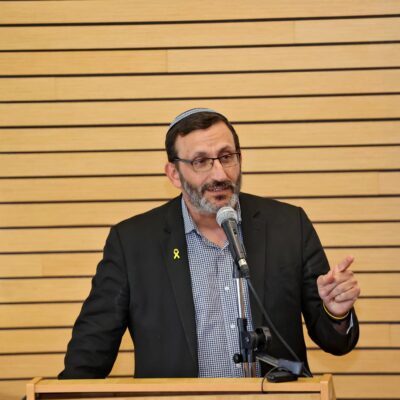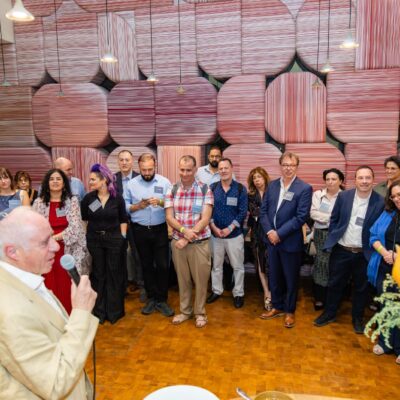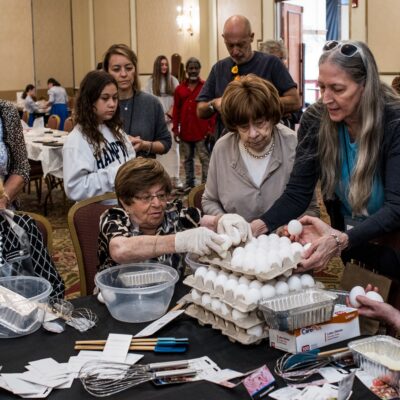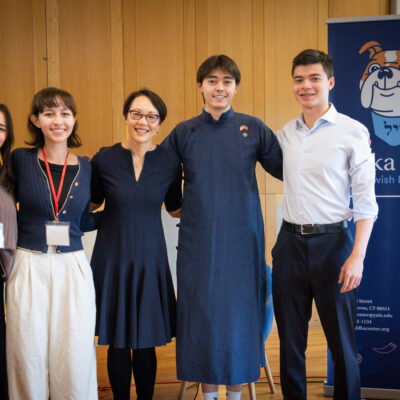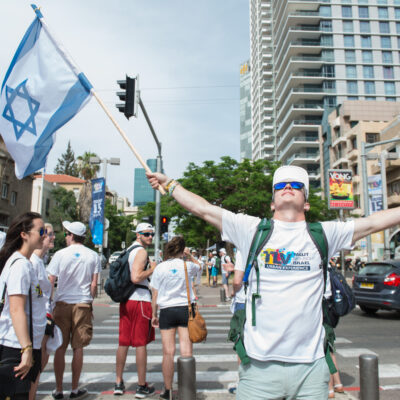DIAMOND ANNIVERSARY
Memorial Foundation for Jewish Culture marks 60 years of enabling Jewish Peoplehood
'The key motif of what my predecessors and I set out to create is to exemplify Klal Yisrael, the notion of Jewish Peoplehood: the idea that we may come into sharp disagreement with some other Jews but we're all part of the Jewish People,' group's president says
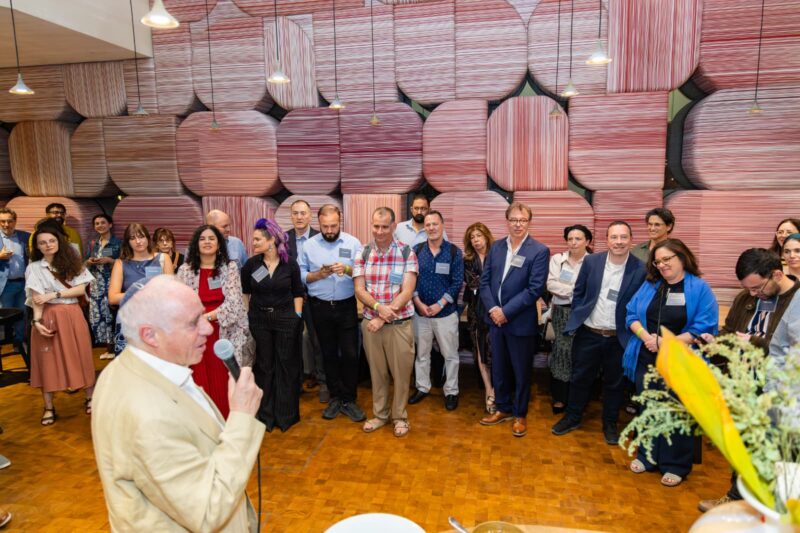
Courtesy/Perry Mendelboym
MFJC President Jonathan Arkush makes remarks at the 60th anniversary celebration of the organization at the National Library of Israel in Jerusalem on Oct. 29, 2025.
The Memorial Foundation for Jewish Culture has gone through multiple iterations in its 60 years. First the organization, which was founded by Nahum Goldmann with German reparations, focused on reconstructing Jewish cultural life in the wake of the Holocaust and then pivoted to a broader focus on Jewish Peoplehood. More recently, the foundation has started working to prepare the younger generation with resiliency tools to confront growing antisemitism worldwide.
“We want to be that organization that fosters Jewish life, that increases the number in quantitative and qualitative approach of Jewish intellectual production,” said Fernando Lottenberg, chair of MFJC’s executive committee. “I think we can be an important actor in expanding the knowledge about us in the Jewish and non-Jewish world.”
Lottenberg made his remarks in Jerusalem, along with MFJC President Jonathan Arkush, and CEO Rabbi Jeni S. Friedman, where they had traveled to mark the foundation’s 60th anniversary celebration on Sunday at the National Library of Israel. Also in attendance were MFJC board members from across the globe, grantees from various programs across the MFJC over the life of the organization, and faculty and fellows across the Nahum Goldmann Fellowships network.
The day after the event, board members held a briefing with Shalom Hartman Institute senior fellow Yossi Klein Halevi.
The celebrations were initially planned for June, but the Israel-Iran war that month forced the organization to postpone the event, though a Zoom meeting with Israeli President Isaac Herzog was stil held.
“The key motif of what my predecessors and I set out to create is to exemplify Klal Yisrael, the notion of Jewish Peoplehood: the idea that we may come into sharp disagreement with some other Jews but we’re all part of the Jewish People,” said Arkush. “We are all going to look out for each other. We may not agree on the answers to every question, but we are all part of the same whole with a destiny. I am confident that in the future we may have to adapt to different circumstances. But the motif of Klal Yisrael will continue to inspire what we do.”
Nearly 30 years ago, the MFJC refocused its mission on developing future Jewish leaders through its flagship Nahum Goldmann Fellowship — a weeklong program held alternately in Israel and Diaspora communities. Bringing together 36-40 emerging leaders ages 25-40 from around the world, the fellowship offers intensive Jewish learning while building practical skills in resilience and responding to hostility, prejudice and antisemitism. With over 1,300 alumni from 35 fellowships, it maintains a global network of support, education and crisis response. MFJC also advances scholarship through its Advanced Torah Fellowship and four academic Jewish studies grants, including emergency assistance for Jewish studies scholars in Ukraine.
Sergio Berman, an MFJC board member and president and CEO of the World Union for Progressive Judaism, noted the pivotal role the MFJC played in his own professional trajectory, having been awarded a grant 30 years ago that permitted him to pursue his rabbinical studies in the U.S..
“I will always be grateful that they gave grants for [Jewish scholars] in the periphery,” said Bergman, who is originally from Argentina and served as a minister there. “In the Jewish world [the focus usually] begins in the U.S. and Israel, and then after that there is us ‘in the rest of the world.’ I am convinced that Jewish identity is connected to culture and over the past 60 years MFJC has emphasized diversity, inclusivity and pluralistic values allowing for every kind of Jewish expression.”
Indeed, the MFJC continues to champion the development of the next generation of scholars and leaders, Lottenberg said, while also working to strengthen Jewish communities worldwide and foster a deeper sense of global Jewish connectedness, celebrating diversity and pluralism within the wider international Jewish community and adapting to recent challenges.
The foundation has also shifted its focus beyond its traditional Eastern European Ashkenazi narratives, extending and giving space to cultural expressions of Sephardic and Mizrahi traditions, and Mizrahi communities as well as cultural traditions from other Jewish communities in places such as Yemen and Ethiopia.
“We have to be attentive to what the times demand from us. We cannot rely on our previous conquests. The things that we have achieved…are amazing and we should value it, but we need to give answers to the new challenges,” Lottenberg said.
The most recent challenge facing the Jewish world, he said, is the increasing “new expression” of antisemitism and how it has infiltrated into so many aspects of Jewish lives. Focus should be put on training the younger generation to face these new challenges, he said.
“We can train young people to identify the threats and their real friends based on knowledge, based on culture,” he said. “This mission will continue and will evolve to this new generation that are getting the information not only from traditional sources of knowledge but from social networks and platforms.”
Naivety in this environment is not an option, he said.
“So we thought that maybe we had more friends than we really do. This doesn’t mean that we have to isolate ourselves, but that we find in our traditions…in our culture the issues that make us relevant in a world like this,” he said. “I think we have to understand without prejudice, without agreeing to it…why this has found such a favorable environment in which to thrive. We don’t have the recipes, we don’t have the solutions, but we have learned a few things.”
While supported by a core endowment largely derived from German reparations money, the foundation is focused on raising additional funds to support its growth and expansion, said Arkush. The primary goal for the next decade is to scale up the Nahum Goldmann Fellowship, aiming to hold at least two programs per year, up from the current one. The foundation is actively seeking collaborations with other organizations to leverage its work and broaden its impact, he said.
“It is not easy to raise funds in…this climate, but we meet a lot of people who actually get what we do and want to support it,” he said. “But to my mind, having a 60th anniversary of a Jewish international communal organization is a significant achievement in itself.”
Friedman, the foundation’s CEO, anticipates also creating more cohort-based programs and more events that foster cultural exchanges stemming from a broad definition of Jewish culture, encompassing art, music, Torah study and Jewish leadership.
“My hope is that by continuing to do more cohort-based programs and bringing the people who are the academics and the Torah scholars and the leadership training fellows together [we are providing] a significant contribution in an increasingly fractured Jewish world,” she said.

 Add EJP on Google
Add EJP on Google
